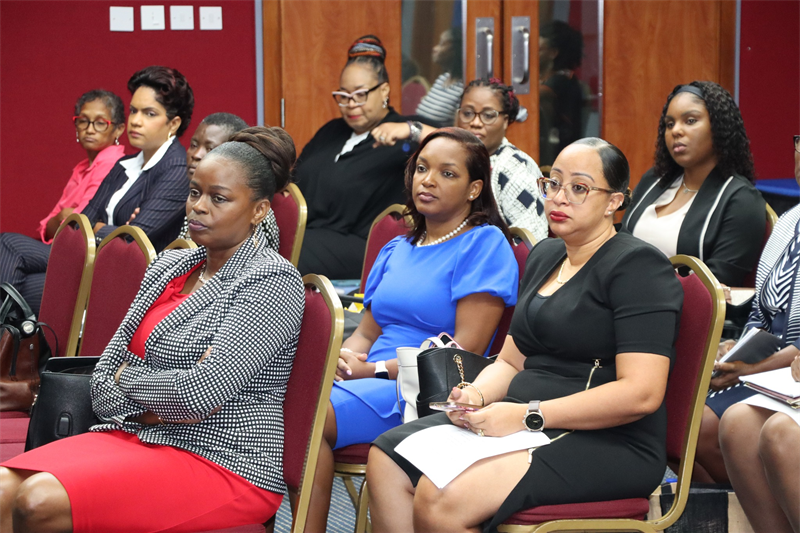St. Lucia Advances Fight Against Non-Communicable Diseases Through National Stakeholder Consultation
The Escalating Threat of Non-Communicable Diseases in Saint Lucia and the Imperative for Collaborative Action
Saint Lucia, like many nations globally, faces a growing health crisis fueled by the rise of Non-Communicable Diseases (NCDs). These chronic conditions, including heart disease, stroke, cancer, diabetes, and respiratory illnesses, pose a significant threat to the well-being of the population and place an increasing burden on the healthcare system. Recognizing the urgency of the situation, the National NCD Committee convened a high-level stakeholder consultation to bolster collaborative efforts and strengthen national strategies for NCD prevention and control. This crucial meeting aimed to bring together key actors from various sectors to share knowledge, formulate a comprehensive approach, and enhance community engagement in combating this escalating health challenge.
A Multi-Sectoral Approach to Combatting a Complex Health Challenge
The consultation underscored the vital need for a multi-sectoral approach to effectively address the complex and multifaceted nature of NCDs. Recognizing that NCDs are not merely a health issue but a societal challenge, the meeting sought to engage stakeholders from across various domains, including government, healthcare, education, community organizations, and the private sector. This collaborative strategy is rooted in the understanding that addressing NCDs requires a concerted effort that transcends traditional boundaries and fosters partnerships across diverse sectors of society.
Dr. Shana Cyr-Philbert, Senior Medical Officer for NCDs, emphasized the necessity of a holistic and sustainable approach, highlighting the importance of multi-sectoral coordination. She outlined the objectives of the consultation, including exploring the Ministry of Health’s role and limitations in addressing NCDs, examining current trends and risk factors, and embracing evidence-based prevention strategies. Dr. Cyr-Philbert’s emphasis on a multi-sectoral approach highlights the understanding that combating NCDs requires a collective effort involving various government agencies, non-governmental organizations, and community stakeholders. This collaborative strategy recognizes that effective NCD prevention and control extends beyond the healthcare sector and necessitates addressing underlying social, economic, and environmental factors that contribute to the development and progression of these diseases.
Strengthening Partnerships and Empowering Communities
The consultation focused on amplifying existing initiatives and building new partnerships to more effectively combat NCDs. Programs like Saint Lucia Moves, the Community-Based Programme (CBP), and Know Your Numbers were highlighted as vital tools in promoting healthier lifestyles and raising awareness about NCD risks. The emphasis on these community-based programs reflects a shift towards empowering individuals and communities to take an active role in their health and well-being.
By fostering collaboration with athletic clubs, NGOs, workplaces, and other community organizations, the consultation sought to create a network of support that extends beyond traditional healthcare settings. This approach recognizes the crucial role of community engagement in promoting healthy habits and addressing the social determinants of health, such as access to healthy foods, opportunities for physical activity, and supportive social environments. Engaging local communities in NCD prevention and control efforts is crucial for ensuring that programs are culturally relevant and accessible to those most at risk.
Tackling Risk Factors through Collaborative Action
The consultation placed significant emphasis on addressing the modifiable risk factors that contribute to the development of NCDs. These risk factors, which include unhealthy diets, physical inactivity, tobacco use, and harmful alcohol consumption, are often deeply intertwined with social, economic, and environmental factors. The consultation underscored the need for collaborative action to create environments that support healthy choices and empower individuals to adopt and maintain healthier lifestyles.
The consultation underscored the crucial role of these existing programs and highlighted the need to expand and strengthen their reach within local communities. Addressing issues such as sedentary lifestyles and unhealthy diets requires a multifaceted approach that includes public education campaigns, promoting access to healthy and affordable food choices, and creating opportunities for regular physical activity within the community.
Government Leadership and Inter-Sectoral Collaboration
Ernest Norbal, Deputy Permanent Secretary in the Ministry of Health, Wellness, and Elderly Affairs, reinforced the vital role of governmental support and inter-sectoral collaboration in driving NCD prevention and control efforts. His statement underscored the necessity of collaborative policy development and implementation across various sectors to promote healthy environments and support individual lifestyle changes. The commitment of the Ministry of Health to fostering collaboration highlights the importance of government leadership in driving a comprehensive national response to the NCD crisis.
The government’s role in implementing policies that promote access to healthy foods, adequate physical activities, and informed lifestyle choices is essential for creating an environment that supports healthy living. Prioritizing vulnerable populations in these efforts is crucial for equitable health outcomes and ensures that programs and resources reach those who need them most. This includes addressing health disparities and ensuring that all individuals, regardless of their socioeconomic status, have equal opportunities to achieve and maintain good health.
Promoting Public Engagement and Empowering Individual Action
Selva Wilson, Physical Education Sports Specialist, emphasized the critical importance of public engagement and empowering individuals to take control of their health. Engaging with the public and raising awareness about NCDs, including recognizing their often subtle and insidious onset, is a crucial step in enabling informed decision-making and promoting preventative measures. Wilson’s focus on public engagement highlights the critical role of individuals in taking ownership of their health and making healthy lifestyle choices.
Empowering individuals to adopt and maintain healthy lifestyles requires targeted public health campaigns that provide clear and accessible information about NCD risks and prevention strategies. Promoting regular health screenings and check-ups is also essential for early detection and timely intervention, which can significantly improve health outcomes. The engagement of community leaders, healthcare providers, and other trusted voices within the community can play a critical role in disseminating information and promoting behavior change. By fostering a sense of shared responsibility and empowering individuals to take an active role in their health, Saint Lucia can make significant strides in combating the NCD epidemic and improving the health and well-being of its population.
Share this content:












Post Comment